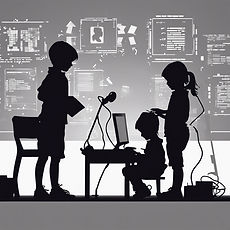
Learn More
English Language Development
English Language Learners (ELLs)
An English Language Learner (ELL) student is an individual who is in the process of learning the English language in addition to their native language. These students come from diverse linguistic and cultural backgrounds and may range from young children to adults. To ensure the success of language acquisition, ELL students should be provided with comprehensive supports and learning opportunities.

Academic English Learners (AELs)

An Academic English Learner (AEL) student is someone who is in the process of acquiring proficiency in English, specifically in the context of academic settings. These students often face the dual challenge of mastering both subject-specific content and the language of instruction. Scaffolding can include strategies like visual aids, modeling, and structured tasks that gradually increase in complexity.
Supports for ELLs and AELs include access to specialized language instruction tailored to their proficiency levels, as well as regular classroom activities that promote language development. Educators should employ a variety of instructional strategies, such as visual aids, interactive activities, and scaffolded learning, to make content accessible and engaging. Additionally, creating an inclusive and supportive classroom environment where students feel safe to practice their language skills is crucial. Opportunities for peer interaction, such as group projects and collaborative learning, can also enhance language acquisition and by providing real-life contexts for communication. Furthermore, involving families and communities in the learning process can foster a sense of belonging and encourage the use of English outside the classroom. By integrating these supports and opportunities, these students can develop the language proficiency needed to succeed and helps bridge the gap between their current language abilities and the academic demands.

Soft Skills and Hard Skills
Soft Skills
Soft skills are essential personal attributes that enable individuals to interact effectively and harmoniously with others in the workplace. These skills include communication, teamwork, problem-solving, adaptability, and emotional intelligence. Unlike technical skills, which are job-specific and often acquired through education and training, soft skills are more about how you work and how you interact with colleagues, clients, and customers. They are crucial for building relationships, fostering a positive work environment, and navigating the complexities of today's collaborative and dynamic professional landscape. Developing strong soft skills can significantly enhance career prospects and lead to greater job satisfaction and success.

Hard Skills

Hard skills are specific, teachable abilities or knowledge sets that are essential for performing particular tasks in various careers. These skills are typically quantifiable and can be acquired through education, training programs, certifications, and on-the-job experience. Examples of hard skills include proficiency in software applications, technical writing, data analysis, coding, foreign language fluency, and machinery operation. Mastery of hard skills is often a key requirement for job qualifications and can significantly enhance an individual's employability and career advancement opportunities.
Educational resources play a crucial role in helping students develop both soft and hard skills necessary for successful careers. Comprehensive curricula and hands-on training provide the technical knowledge and practical experience required for proficiency in specific fields, enhancing hard skills such as coding, data analysis, or engineering. Simultaneously, resources like group projects, communication workshops, and leadership seminars foster essential soft skills including teamwork, problem-solving, and effective communication. By integrating these resources into the learning environment, students are better prepared to meet the multifaceted demands of the modern workforce, ensuring they not only excel in their technical roles but also thrive in collaborative and dynamic professional settings.
